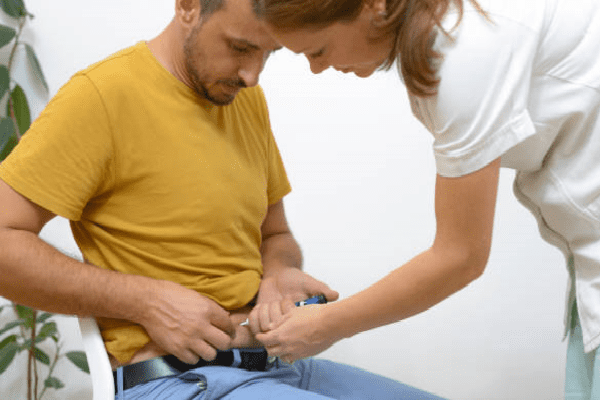Emergencies >>>> Hyperglycemic coma is an emergency
Hyperglycemic coma is an emergency.


Hyperglycemic coma (synonym: diabetic coma) is an extremely serious condition in diabetes mellitus, when the concentration of glucose in the blood rises as a result of a lack of insulin. At the same time, the body cannot utilize glucose accumulating in the blood, which leads to starvation of peripheral tissues and organs experiencing an acute lack of glucose.
Unlike hypoglycemic coma, hyperglycemic coma is not associated with a lack of glucose, but with a lack of insulin, which helps to absorb glucose, and this must be remembered. Hyperglycemic coma develops slowly, gradually (within a day and much longer). It is worth paying attention to the signs of hyperglycemic coma:
- Headache, dizziness develops;
- Decreased appetite;
- There is a feeling of nausea;
- The symptoms of dyspeptic disorders of the gastrointestinal tract are increasing;
- Constant thirst, accompanied by dry mouth (a person begins to drink a lot and regularly drink water);
- The skin is dry and warm without sweating;
- The smell of acetone is felt from the mouth;
- The pressure decreases, the pulse is weak;
- Urination becomes more frequent;
- When pressing on the eyeballs, one feels how their elasticity is disturbed;
- Apathy, forgetfulness, drowsiness gradually develop;
- Then the person falls into unconsciousness.
First aid for hyperglycemic coma:
- Call an ambulance,
- Give the patient a supine position,
- Free the chest from embarrassing clothing,
- Make sure that the tongue does not sink,
- Enter a short-acting insulin,
- Control the pressure and, if necessary (with severely reduced pressure), take medications to increase the pressure;
- Drink plenty of fluids.
The reasons for the development of hyperglycemic coma:
- Insufficient dosage of insulin in the treatment of diabetes mellitus,
- Missed insulin injection,
- Violated diet in diabetes mellitus,
- Expired or frozen insulin,
- Diseases of the pancreas and other conditions that decrease insulin production and increase blood glucose levels.
Hyperglycemic coma is dangerous because it will lead to death against the background of decreasing pressure, impaired respiratory and cardiac functions. Therefore, urgent measures (short-acting insulin injection) must be carried out urgently. Treatment of hyperglycemic coma is carried out in a hospital under the supervision of qualified personnel.

Read

Read



























